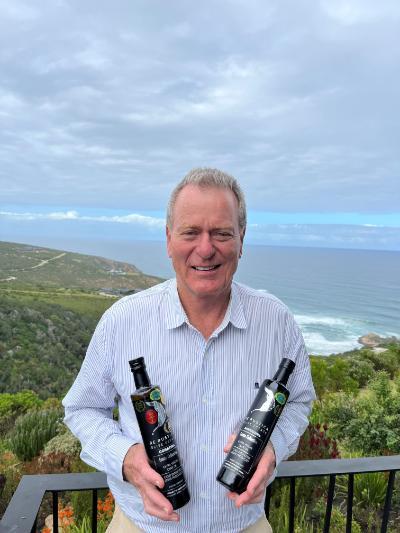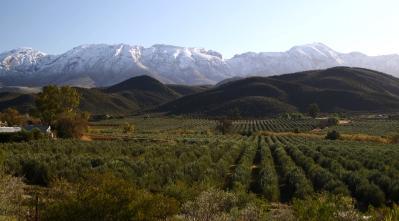Witsie produces “best olive oil in the world”
- Wits Alumni Relations
De Rustica Olive Estate, owned by Rob Still, becomes the first winner from outside Spain or Italy in the history EVOOLEUM Awards.
Wits-trained accountant and olive oil farmer Robert “Rob” Still (BCom 1978, CTA 1980) won first place at the eighth edition of the prestigious 2023 International Extra Virgin Olive Oil Quality Awards (EVOOLEUM).
De Rustica Olive Estates, which Still founded in 2006, received the accolade for its Coratina oil, beating 999 other entrants to be named the “EVOOLEUM Overall Best”.
The EVOOLEUM Awards is an annual Spanish competition promoted by Mercacei magazine and awarded by the Spanish Association of Olive Tree Municipalities assessing the quality of extra virgin olive oils from across the world. A panel of 26 judges blind-tasted nearly 1 000 olive oil samples from global producers.
Still’s 4000ha-olive farm is nestled in the Swartberg Mountains, around 5km from De Rust. Since production began, De Rustica has consistently won awards both domestically and internationally, which include multiple gold awards at the annual New Your World Olive Competition and Best in the Southern Hemisphere at the Sol D’Oro Awards in 2018. This recent award marks the first time in the awards’ history that an EVOO from outside Spain or Italy has been proclaimed “absolute best”.
The Alumni Relations Office reached out to Still, who lives in Knysna and is currently chairman of Pangea Exploration (Pty) Ltd. The company provides information and analysis to Denham’s African mining platform and is an adviser to Denham Capital Partners, global Private Equity resource financiers, and a partner in the Denham Mining Fund.
How did your interest in olive oil farming begin?
“In my view the essence of life is creativity which takes many forms. It is one measure of one’s impact on the world and a justification for having been there. In my case it was the process of conceiving, designing, funding and executing a new mining project. The pleasure of seeing something rise out of nothing to reach economic sustainability and to employ thousands of people is special and justifies our life.
“Along the way I became somewhat ‘senior’ and that creative pleasure was diluted by hierarchical distance. For example, I was a director and board chairman of Zimplats during its formative years – staff rose from seven to over 10 000 and it was, and remains, a really significant achievement of which I am most proud but I had yet to develop something that was more ‘mine’.
“I was terrified of being forced out of conventional work at 60ish and living a life less relevant with boredom competing with, and enhancing, advancing senility. So, I needed a relevant long-term project or serious hobby to occupy my energies and creative spirit.
“Like many successful South Africans, I toyed with the idea of a wine farm but in that endeavour, I would have been the 300th South Africa businessman to do that, so I turned to olive farming. I have long been interested in olive farming and olive oil – something about the long term and historic nature of it appealed to me together with its wholesome natural essence and in my extensive global travels for work I had visited a few such farms.
“I had been exposed to the ‘hidden valleys’ of the Klein Karoo which have a special rugged beauty. Research suggested that the unique climate – especially the cold winters – might be ideal for olives. This area was accessible to the Plettenburg Bay and Knysna area where I planned to settle. It had not been used for olive farming and, in that sense, my farming venture was pioneering. I prefer that to following the footsteps of others.
“The area had become increasingly economically depressed (with the slow demise of the ostrich industry) which made for affordable entry prices to develop a farm of economic scale as well as the potential and critical need for something to uplift the community and area which De Rustica has achieved.”
As a trained accountant, could you share how you’ve navigated these seemingly diverse career paths?
“My career has really had three broad phases. Initially, I was a professional chartered accountant and young partner in Ernst Whinney, a predecessor firm to today’s EY. My focus was technical initially, and consulting later. I worked for and with numerous Wits graduates.
“At 30 years of age I left the profession and entered the world of mining and evolved into a mining entrepreneur, developing several new mining operations and operating globally. We were generally successful and developed an international reputation.
“At about 60 I moved into the world of private equity in mining. I remain active as a partner in a US-based mining private equity company, Denham Capital. Through this entity we have developed mines and are in the process of developing mines in Latin America (copper and rare earths), Africa (tin and niobium), North America (potash, calcium carbonate) and Australasia (metallurgical coal) and the portfolio is progressing well. Denham Capital is the major source of capital for Pangea, which is the Africa ‘platform’ for its operations. Pangea has been the developer of the highly successful Bisie tin mine [in the DRC] – listed as Alphamin."
What does this award/acknowledgment mean to you?
“This award is yet again proof that South Africa produces quality olive oil. It is – again – a proof-of-concept that selected areas in the Klein Karoo make for a top-quality olive terroir.
It confers self-worth and pride to the De Rustica staff and community – vital attributes for ongoing success. This award is of assistance in the ongoing grind of selling annual production at a fair and needed price and perhaps the catalyst needed for an offshore sales beachhead.”
Do you have a recipe for “success”?
“The team has worked hard over years to develop its olive oil quality. Persistence and Discipline have been necessary attributes as has the Vision and Drive to get De Rustica to the top. In the process we have taken extensive external advice and training from international advisors whose brief it has been to list all the improvements and adjustments required.
“In addition the olive terroir has proven excellent especially the high diurnal temperature range caused by altitude. De Rustica has also shown some initiative and innovation in developing proprietary methods of improving the eons-old methods of making olive oil.
“We are concerned about climate change/warming and have implemented a longer-term programme to adjust cultivars and make changes to our orchards to adapt."
Could you share any abiding memories of your time at Wits?
“I spent the period 1975-1977 as a full time BCom student on a scholarship paid by the National Credit Regulator. As was the norm in those days, I then did a BAcc degree in 1978-1979 part-time while working as an articled clerk. Lectures were in the evenings and Saturday mornings. It was serious business and Wits Commerce was probably best in South Africa. For us all, I think, the stand-out person was the Head of Accountancy, Professor Margaret [Ma] Steele. She was a force – highly competent and tough. None of us missed her lectures! My fellow students graduating in 1979 have succeeded in diverse industries globally.”


